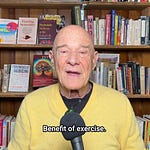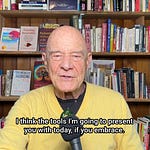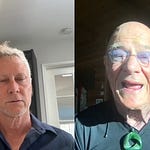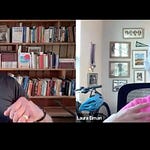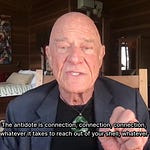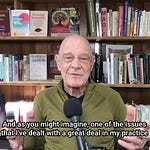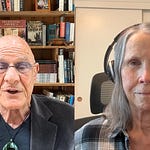Dear friends,
I just finished talking with Mike Jay, and I have to share something that completely changed how I see the history of my own field.
For most of human history, the greatest scientists tested substances on themselves first. Openly. And they were celebrated for their courage.
Humphrey Davy became President of the Royal Academy after synthesizing and inhaling nitrous oxide himself. Sigmund Freud documented his cocaine experiments methodically. William James built his entire philosophy of consciousness from his own psychedelic experiences.
These were the most respected minds of their time.
I started experimenting with psychedelics in 1965—nearly 60 years ago. For all those decades, I've felt like I had to look over my shoulder professionally. Like I needed to keep quiet about the most profound experiences of my life because somehow it made me less credible as a scientist.
But Mike's research revealed something that stopped me cold. This shame, this hiding, this professional fear—none of it comes from scientific tradition. It's all politics and institutional cowardice that started in 1962 with FDA changes that made self-experimentation impossible to publish or fund.
Think about this: In 1962, we decided people studying consciousness couldn't have personal experience with altered states of consciousness. You can study music without listening to it, right?
The result? We have incredible brain scans showing what psychedelics do to neural networks, but we've lost the ability to talk about what those changes actually mean to a human being. We measure everything except what matters most—the experience itself.
Here's what really got me angry. The FDA recently rejected MDMA therapy partly because a therapist in Canada abused a patient during treatment. When anesthesiologists abuse patients under anesthesia, we prosecute the doctor. With MDMA, they blamed the medicine instead of the predator.
That's not science. That's prejudice wearing a lab coat.
Meanwhile, veterans are treating their PTSD with MDMA in underground networks. People are finding healing with psilocybin in living rooms instead of clinics. The healing happens anyway—it just happens without institutional oversight or learning.
Mike reminded me that this isn't how science has to work. We chose this path of institutional cowardice. We can choose courage instead.
Golden light,
Dr. Richard Louis Miller
Links & Resources
Free Radicals: How a Group of Romantic Experimenters Gave Birth to Psychedelic Science
Full interviews available on Mind Body Health & Politics podcast
Work with Me
After six decades as a practicing psychotherapist, I'm offering limited opportunities to work directly with me. I bring extensive experience addressing anxiety, depression, trauma, relationship challenges, addiction, and psychedelic integration.
One-to-one sessions - Individual therapy tailored to your specific needs and goals. To request an appointment, email DrRichardLMiller@gmail.com with subject line "Contact Request." Include what you hope to accomplish and your phone number.
Group Therapy - Join the waitlist for a small, curated group committed to personal growth. Experience community support while learning from others and developing tools for lasting transformation.
Mind Body Health Seminars - My comprehensive 10-week program combines experiential practice with foundational teaching on mind control techniques. This structured approach provides a complete toolkit for mastering your mind. Waitlist coming soon.
The Lost Art of Scientific Courage: Mike Jay's Revolutionary Discovery
When historian Mike Jay began researching the history of psychoactive substances, he expected to find centuries of prohibition and stigma. Instead, he discovered something extraordinary.
"I was staggered to discover when I looked back in history that there had been a period not too long ago in the 19th century where it was pretty much standard practice… If you were a scientist or a doctor or indeed a philosopher or a writer, if you were interested in the mind and in different states of consciousness, it was pretty standard procedure to take these drugs yourself and to describe your own experiences as accurately and clearly as you could."
When Being an Expert Meant Having Experience
Jay's research reveals a fundamental shift in how we define expertise.
"I came to this story in very much the same world where drugs were seen as something that was a problem, a social problem or a medical problem. And the idea of an expert taking drugs themselves was just unthinkable—as if you took drugs yourself, you were a user, you weren't an expert."
But this modern perspective would have baffled 19th-century scientists. They faced a simple moral question: If you wouldn't test it on yourself, why would you test it on sick people who need treatment, not experimentation?
The Heroes History Remembers
Jay traces this tradition to 1799, when Humphrey Davy synthesized and inhaled nitrous oxide, launching his career to the presidency of the Royal Academy. Davy assembled friends—including poet Samuel Taylor Coleridge—to systematically explore these new states of consciousness.
"That's the moment where you have, I think for the first time, this really systematic exploration of new states of consciousness being induced by a new drug that's just been developed in the laboratory," Jay notes.
Sigmund Freud methodically documented his cocaine experiments, not as an addict but as a researcher seeking cognitive enhancement for the exhaustion of industrial society. William James built his entire philosophy of consciousness from direct experience with nitrous oxide, giving us the concept of "stream of consciousness."
The 1962 Turning Point
"If you wanted to pick a single moment where the tables decisively turned, I would pick 1962 and the Kefauver-Harris amendments to the FDA protocols, which set up what we now regard as standard drug testing."
These protocols established our current system of randomized, double-blind, placebo-controlled trials. The goal was admirable—preventing unethical testing while ensuring drug safety. But the unintended consequence was devastating for consciousness research.
"That really made subjective impressions and subjective descriptions of drugs unnecessary… Quality was established by the fact that it worked the same for everybody. So psychedelics were never gonna be quality medicines because everybody has such different effects."
Barry Marshall: The Last Hero
Jay identifies Australian doctor Barry Marshall as "the last person who won a Nobel Prize for self experimenting." In 1984, Marshall drank a culture of Helicobacter pylori bacteria to prove ulcers were caused by infection, not stress. He developed gastritis, cured it with antibiotics, and won the Nobel Prize in 2005.
Marshall's story illustrates both the power and the rarity of this approach in modern science.
The Politics of Scientific Funding
One of Jay's most striking insights concerns how funding shapes research conclusions. "It's astonishing to me how much that changed the science," he observes. "Up until that point, there was an enormous amount of research about MDMA and all of it was about how neurotoxic it was, how people taking MDMA had brain scans that looked like Swiss cheese full of holes."
"And suddenly when the funding stream changed, we suddenly started to get all the stuff about how incredibly useful MDMA is in therapy, how pro-social it is, how the positive life experiences it produces."
Jay's conclusion is damning: "Science reflects the questions that you ask it."
The Underground Renaissance
While institutions abandoned self-experimentation, the work didn't stop—it went underground. Jay sees this particularly in military veterans treating PTSD with MDMA outside clinical settings.
"This is kind of group therapy of a group of people who've all suffered horrendous trauma and they're all on the same journey together… It seems more like the model of Alcoholics Anonymous or Narcotics Anonymous, rather than the model of going to the doctor and having a highly paid medical professional supervising the whole business."
Jay draws parallels to the early Native American Church, where broken communities used peyote ceremonies to rebuild social fabric after being forced onto reservations.
Two Languages of Science
Jay identifies a fundamental problem in modern consciousness research: "There are two different languages that don't quite fit together. One is the language of pharmacology and brain chemistry. The other is the language of experience and consciousness. We're very interested in both, but they're still mutually unintelligible languages."
Modern neuroscience excels at brain scans and neurochemistry, but struggles to translate those measurements into understanding of subjective experience. We've gained precision but lost meaning.
The future of consciousness research may depend on remembering what our scientific ancestors knew: sometimes, to truly understand something, you have to be brave enough to experience it yourself.
Dr. Richard Miller's Mind Body Health & Politics podcast features weekly conversations with researchers, authors, and pioneers working at the frontiers of human consciousness and healing. All episodes from the past 20 years are available free in the archives.
Now Available: Psychedelic Medicine at the End of Life
You can now order my latest book, Psychedelic Medicine at the End of Life: Dying Without Fear. This work represents a culmination of my decades-long journey as a clinical psychologist, exploring how psychedelics can transform our approach to death and dying.
The book examines how substances like LSD, MDMA, and psilocybin can be powerful tools in confronting our fears of mortality, ultimately leading to richer, more fulfilling lives. I'm honored to include insights from renowned experts in the field, as well as my own experiences.
Here's what some esteemed colleagues are saying:
James Fadiman, Ph.D., calls it "a deeply uplifting, clear, and compassionate guide to dying and how psychedelics, used correctly, diminish our fears about approaching the door that opens at the end of our life."
Charles S. Grob, M.D., describes it as "a masterful overview of an area of vital importance to our modern world... a valuable resource and contribution to the growing field of psychedelic medicine."
Julie Holland, M.D., notes that "Psychedelics may offer a mini-death rehearsal, offering a glimpse of spiritual oneness, enabling us to be less afraid at the end of our lives."
I hope this book will inspire meaningful conversations and new perspectives on how we approach the end of life.
My Books:
Psychedelic Medicine at the End of Life: Dying Without Fear (release date: November 5)
Freeing Sexuality: Psychologists, Consent Teachers, Polyamory Experts, and Sex Workers Speak Out
Psychedelic Wisdom: The Astonishing Rewards of Mind-Altering Substances
Psychedelic Medicine: The Healing Powers of LSD, MDMA, Psilocybin, and Ayahuasca
Integral Psychedelic Therapy (co-edited with Jason A. Butler & Genesee Herzberg)




